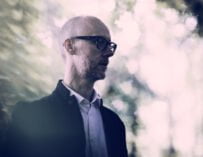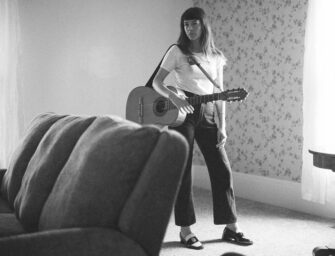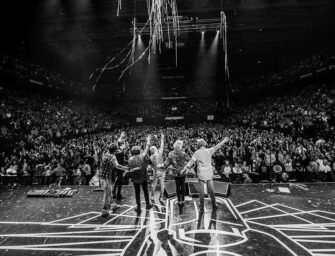
James Morrison: “I kind of went from singer in a pub to singer-songwriter within three weeks!”
Rugby’s gravel-voiced soul man talks about the merits of commercialism, collaboration, spontaneity and singing in hotel fire escapes
When James Morrison broke onto the scene as a soulful singer-songwriter in 2006, even he couldn’t have predicted that he would become the template that allowed a wave of like-minded musicians to enter the field. Now, almost ten years on, Sam Smith, Ed Sheeran, George Ezra and James Bay are all crowding the charts, following the same format: one guy with a great, soulful voice and a guitar.
James really was the first to take that format and, not only make it work, but also become an overnight success story. Pop gems like You Give Me Something from his debut album Undiscovered, made him anything but and he won the 2007 BRIT Award for Best Male when he was still just 21 years old. He was also told by the veteran soul producer Jerry Wexler that his raspy, gravelly voice – the product of a childhood illness – had its “own thumbprint” and was so distinctive that it was “once heard, never forgotten”.
2008’s Songs For You, Truths For Me brought with it a string of Top 10 singles, including the phenomenally catchy Broken Strings with Nelly Furtado, with his last album, 2011’s Awakening shooting straight to No 1 and selling over one million copies worldwide. The 30-year-old singer-songwriter has now sold 4.5 million copies of his three albums, performed four world tours – including sold-out shows to thousands at London’s Hyde Park, supporting both Bruce Springsteen and Stevie Wonder – and appeared on Herbie Hancock’s Grammy-winning album The Imagination Project.
Songwriting caught up with the singer-songwriter from Rugby, as he prepared to release his fourth studio album, Higher Than Here. We found James in buoyant mood, ready to dissect his relaxed, collaborative approach to songwriting…
What was the first moment you went from playing covers in bands to writing your own material?
“I got into music late at school as a GCSE student, even though I was doing A-levels. We had to write songs for an exercise. Even then, I didn’t see myself as a songwriter, I just knew how to make songs my own. But that was about it really. I had some live experience with busking and playing gigs. I was in a school band and we used to gig in the summer, about four times a week, so I got a lot of live experience before I got any songwriting experience. But, obviously, each bleeds into the other, really, and because I was playing so many songs, it just felt like a natural progression to start writing my own.
“Then I met a guitar player who was on the open mic scene in Derby and he said, ‘Hey man, I’ve got a studio. If you’ve got any songs of your own, let’s put them down.’ I had about two songs that I’d written by that point, so I put them down and I started writing with him, and it kind of went from there, really.”
Did those two songs ever see the light of day, or are they long forgotten now?
“No, they were demos that got me the deal, or rather they got the labels interested in my voice. I literally wrote those songs, put them down in the studio within two weeks and two weeks after that I was talking to labels. So it did all happen very quickly, once it happened, but then there was a year between me seeing the labels and getting signed. I kind of went from singer in a pub to singer-songwriter within three weeks!”
Were the tracks that ended up on Undiscovered simply part of your development when they signed you, or were you tasked with making your debut album right from the start?
“It was a simultaneous thing really. I was just starting to write my own songs as I started writing with other people for the first time, so I was just trying to see what I could do. Then, at the end of that year when I was seeing what I was capable of, all the songs were there! They were like, ‘We want to put it out,’ and I was like, ‘Oh, er… okay!’ So it was just me trying to make the best of what I’d been given. I was given the opportunity to be an artist, sign to a label and to try to write enough songs that sounded good, and represented my voice. That’s all I really did, I tried to write songs that felt familiar in some way, so it didn’t feel like I was a singer-songwriter from nowhere. I wanted the tunes to be reminiscent of the songs I liked, that I used to play live, which is why I kept the chord progressions quite simple and relatable.”

James Morrison: “I like the idea of trying to write a mean love song… without making the other person going, ‘What’s the point?’”
Thinking back to You Give Me Something – the song that really kicked off your career – can you recall how you wrote that with Eg White?
“Basically, I got the initial idea together on my own, while I was working with someone else. I remember I just had the C to the descending A minor chord, to the G, to the F and back to the G. That was what I had, which is the progression in the verse, with a few subtle changes. And I was saying something like, ‘Will you stay with me in the morning / will you hold me when I sleep’. I had that, but then we changed the lyric to: ‘You only stay with me in the morning,’ to make it more harsh, like you’ve got to work to get the love. I think that was the key that kind of turned the song around, really – the reluctance in giving away nice comments in the song. I like the idea of trying to write a mean love song: as mean as you can be, without making the other person going, ‘What’s the point?’ It’s kind of like backhanded compliments really.
“It was those three chords in the intro that really cemented it. I had the verse and then we worked on the chorus together, and I imagined the chorus melody to be like brass. Once I got the chorus, I remember thinking, even back then, ‘I don’t want brass in my songs, because it’s too Frank Sinatra,’ or something. I was that naïve with music. It was only after a few months of listening to the song that I thought, ‘Yeah, actually, this is a fucking good song!’
How did it work out with the other sessions for that album?
“All those songs came about from me trying different people and different situations and styles, and seeing how far I could stretch myself, as an artist. I knew I didn’t want to be just a boring, white guy singer-songwriter singing folky pop – I wanted it to be soulful, I wanted to have a touch of black music, but obviously, I’m a white guy so I wanted it to reflect me as a person. Rather than using soul as a musical style, I wanted the soul to be in my voice, rather than too much of the production. That’s all I knew at that time. So all those songs just came from me trying to explore how far in each direction I could take it.”
Did that naivety help take away any pressure on you for the first album?
“Yeah, definitely.”
How about when it came to approaching the second album, did you feel the weight of expectation then?
“I just approached it with the same amount of naivety and thought, ‘If we get something amazing then great, but if not then I tried,’ you know?”
What was it like working with heavyweight songwriters like Ryan Tedder, Fraser T Smith and Dan Wilson?
“I like the idea of mixing a raw, unhoned skill with people who are really good at writing hooks. I think the two together make a really good song, because I don’t write commercially – I try to write to create a feeling, then I try to get that feeling to something that could be commercial. But all those guys, who are proper professional songwriters, are the ones who help me take a personal idea and make it big. I’ve always enjoyed the mixture of the two, and that balance is the thing that I’ve always tried to maintain.”

James: “I can write by myself, but it takes a lot longer to come together and it’s less surprising”
One set of names that carry through all your albums is Martin Brammer and Steve Robson. What is it about those guys that you click with?
“Steve, for one, has got such a pop melody head on him – he’s always thinking, ‘What’s the hook?’ Whereas Martin’s always thinking, ‘How do we get an interesting lyric?’ So they’re both kind of from different worlds, but with the three of us together, we always come up with a really good lyric, that means something, with a hook that you can remember, that’s not too commercial. On my latest album, I wrote one of my favourite songs with those two, Just Like A Child. I think that’s a good example of me getting the best out of the both them.”
Who else have you been writing with on the new album?
“I’ve worked with a few of the old guys, like Eg, because whenever we work together we always do something interesting and it’s always fun working with him. Martin and Steve, I worked with. Some new people like Simon Aldred, who was in Cherry Ghost, I worked with a guy called Fred Cox who’s a new writer-producer who’s like 23 years old, I worked with Malay who did John Legend… I tried a few new people out and stayed with people who I know when I write with it’s always good. I wasn’t up for trying loads of new people because it wastes a lot of time and it’s not always productive.
You clearly enjoy collaborating, but are you really averse to working alone?
“I can write by myself, but it takes a lot longer to come together and it’s less surprising, for me, to know exactly where I’m taking it. I like being a thrown a surprise and I always get that from working with other people, especially because they’re objective or they think outside the box, whereas I only think how I think. It’s nice to get pushed out of your comfort zone and that’s what I wanted from working with other people – they help to push those boundaries.”
Thinking about your own personal songwriting process, is there a set way you approach it?
“Yeah, I literally sit down with my guitar, maybe play one, two or three chords and start to base the melody around those chords, or put chords to a melody. It’s always those two things first. I don’t normally get the lyric first, but sometimes I do, like Wonderful World or Just Like A Child or Piece That Don’t Fit, or even Demons, from the new album. Like with In My Dreams, I had the title and I worked back from that. But, most of the time, I let the melody dictate what it’s going to be about and let my subconscious figure it out. The more ‘non-thought-out’ the better, really, rather than sitting down and mathematically thinking, ‘I want to write a song about this.’ I just let it come out naturally. Sometimes I don’t know what it’s about until the end!”
Are you recording those ideas, as you go?
“Yeah, exactly, I get little nuggets and put them in my phone and then take them into the studio. But, on this album, a lot of it was made up on the spot – I didn’t have any idea of what I wanted. I just turned up at the studio and thought, ‘Let’s write a song today.’ I think if you go in with a set idea of what you want to write, it cuts off a lot of avenues. So I liked the pressure of going in and not knowing what we were going to write. Obviously, nine times out of ten, we’d write a song that wasn’t great but, because of that approach, every six or seven songs I’d get one that was fucking great! So it was worth going through that torment.
So it was the spontaneity you were after, with this album?
“Yeah, I didn’t want to spend one moment worrying about how we get to the chorus or whether it was a big enough chorus, or… I just tried to let the melody and the music take me on a journey and, if was something that could fit into an album, then I’d put it on there.”

Morrison: “The less you think about it and the more stupid you think it is, the better it is.”
How many songs did you end up writing and recording during those sessions?
“Eighty. There was definitely another album’s-worth of material that was good, but it just didn’t fit into this period of time. With most of those songs that didn’t get picked, there was a good reason why. It’s taken me a year-and-a-half to hone those 80 songs down to 14 and literally every track has gone through the process of being listened to loads of times. I’ll give them some space before listening to them again or I’ll play it to friends and I just narrowed it down by a process of natural selection. I’m lucky that everyone liked the same songs that I liked – it was obvious which songs worked and which ones were good.”
Where did you record this album?
“In and out of London in various different studios – nowhere really glamorous. Most of them were one room and a vocal booth. A lot of the finished tracks are the demos with a few embellishments, like Just Like A Child is the demo, Demons was pretty much the demo and the same with Heaven To A Fool. That’s why I think there’s a freshness to it – it’s not too slick.”
So would you say that the place that you write isn’t really important?
“No, it doesn’t really make a difference. The main thing that kind of helps is, when I’m staying in a hotel, the fire exits have great reverb! It just sounds good when you sing, so it inspires you to sing something nice. So a few times I did that to get some ideas together and hone down some of the melodies, but generally it was all done on the spot [in the studio] and make a decision, as it comes.”
Can you think of a song that might have been developed in a fire escape?
“Yeah, Just Like A Child. I had the lyric and I didn’t know how I was going to relate it to anything. Then I thought about naivety and about my daughter falling over and thought it would be cool to say, ‘If we fall, let’s fall with style.’ Once I got that image in my head, I made the connection.
“There’s a song on the album called Easy Love and that just came to me and I wrote it down on a napkin. Then I went in the next day and put it down. I’ve been getting into the more off-the-cuff, the less you think about it and the more stupid you think it is, the better it is. My brain always wants to get away from commercialism, but at the same time I can’t help but go towards that place because I want the tunes to be heard. It’s like I’m fighting against it and giving into it at the same time.”
You’ve also managed to get your songs cut by other artists, like My Love Is A Star for Demi Lovato and Quello Che Dai for Marco Carta. How does that happen for you?
“I never write tunes for other people, purposely. I just write for myself and, if I don’t use it, the publishers will go to someone, ‘Here’s a James Morrison song.’ So I’ve always been lucky that people want to do the songs that I’ve done. Mica Paris did one of my songs and Olly Murs did one. The Marco Carter one was translated – it was called You Get What You Give, or something like that.”
If you could collaborate with anyone, who would it be?
“My dream would be to do something with Stevie Wonder. But I met Ella Eyre yesterday and she’s got a great voice. Or maybe do something with a guy – like John Newman or even Paulo Nutini – that would be sick. I’d love to do something with The Black Keys and do something more rocky or bluesy, as part of a band.”


































Hi! Really enjoyed reading this in-depth interview with James about his songwriting. Minor detail: It’s Heaven to a Fool instead of Heaven To A Fall.
So it is! Duly amended now, thanks for pointing out the error :-)